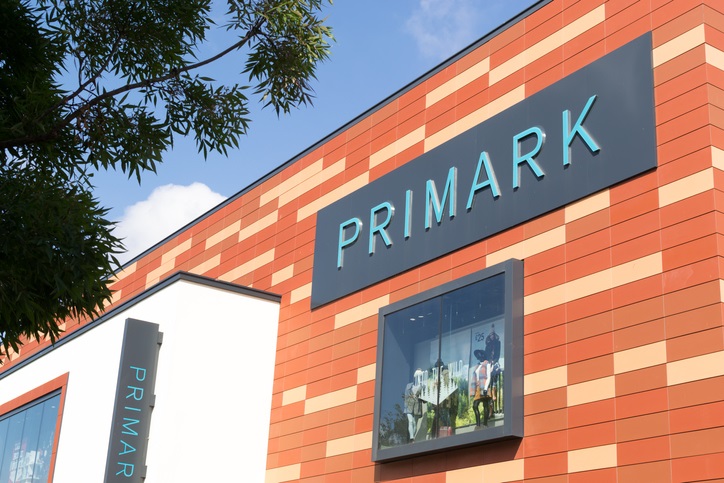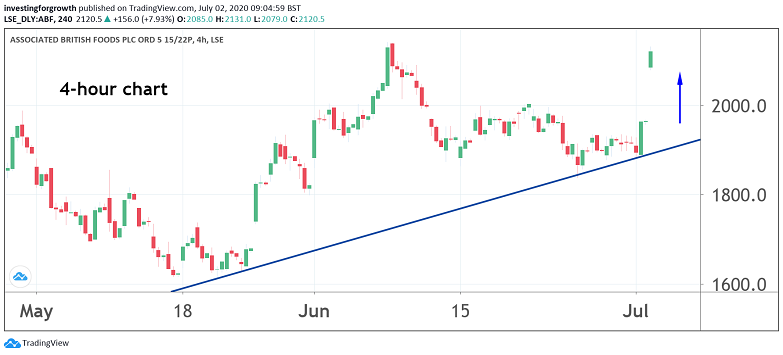How AB Foods became the top FTSE 100 stock
Relief at Primark’s post lockdown sales has AB Foods leading the blue-chip risers.
2nd July 2020 09:36
by Richard Hunter from interactive investor
Huge relief at the performance of Primark post lockdown has AB Foods at the top of today’s leader board, reports our head of markets.

AB Foods (LSE:ABF) will be greatly relieved to have its jewel in the crown restored, and the very early signs are that Primark is picking up largely where it left off.
The diversity of the AB Foods business model has taken some of the sting out of the effects of the pandemic. In particular, the Grocery unit, previously responsible for 28% of operating profit, saw an increase in revenues in its third quarter to 20 June of 9%, leading to a cumulative increase for the year of 3%.
Meanwhile, the Sugar and Ingredients businesses also posted progress, with a slight decline at the smaller Agriculture unit. This has fed through to operating profits which were ahead of the company’s own expectations for Grocery, Agriculture and Ingredients, with a material profit improvement in Sugar, driven by higher EU sugar prices.
However, it is the Primark business, latterly representing two-thirds of group operating profit, which draws most attention. The group had previously advised that the closure of the entirety of its store estate would lead to lost revenues of £650 million per month, and that cost mitigation measures had reduced cash outflow to £100 million per month. The reopening of stores in the UK on June 15 meant that 90% of the store estate was back up and running and that figure has subsequently increased to 98%.
The group describes initial trading as “reassuring and encouraging”, with strong sales in obvious summer lines such as shorts and t-shirts offset by the presently less required formal menswear and travel-related accessories.
The peak of the crisis between early March and the end of May saw cash outflows of £800 million at Primark, partially offset by inflows of £300 million elsewhere in the group. Dialling back to the very first store reopenings in Austria in early May, cumulative sales have totalled £322 million for the estate and the group expects to return to cash generation for the final quarter of the year.

Source: TradingView. Past performance is not a guide to future performance.
Overall, however, the pandemic has left a financial stain which cannot be erased from this year’s trading. Retail revenues in the third quarter declined by 75%, and 27% on a cumulative basis. Contributions from the other business units reduce those figures to a decline of 39% and 13% respectively at group level. At the same time, Primark’s adjusted operating profit for the year as a whole is now expected to be in the region of £300 to £350 million, as compared to £913 million the previous year.
The retailer is already seeing signs of difficulty at its big city stores, where tourists remains absent, although much of this slack is being taken up by its regional stores. In addition, there is a question mark over sales momentum, and whether the initial euphoria of renewed retail therapy will continue amid a period of economic recession and a potentially slow recovery.
- Best and worst performing funds in the first half of 2020
- Dividend kings: reliable income shares hit by Covid cuts
- Take control of your retirement planning with our award-winning, low-cost Self-Invested Personal Pension (SIPP)
Nonetheless, the group is hopefully past the worst of the pandemic and has weathered the storm well, in part due to the group’s financial health, as well as its diversified nature.
Investors have been encouraged by the update, with the early share price spike adding to a 12% increase over the last three months as expectations were positively reset ahead of the store reopenings. Even so, there remains some ground to recover, since the shares have fallen 19% over the last year, exactly in line with the drop of the wider FTSE 100 index during that period.
Yet AB Foods remains a well-regarded stock, with Primark being a key engine to growth, and the market consensus of the shares as a ‘buy’ should remain in place following the relief of the immediate outlook.
These articles are provided for information purposes only. Occasionally, an opinion about whether to buy or sell a specific investment may be provided by third parties. The content is not intended to be a personal recommendation to buy or sell any financial instrument or product, or to adopt any investment strategy as it is not provided based on an assessment of your investing knowledge and experience, your financial situation or your investment objectives. The value of your investments, and the income derived from them, may go down as well as up. You may not get back all the money that you invest. The investments referred to in this article may not be suitable for all investors, and if in doubt, an investor should seek advice from a qualified investment adviser.
Full performance can be found on the company or index summary page on the interactive investor website. Simply click on the company's or index name highlighted in the article.